There are roughly 325 million people in the United States. That is a lot of air conditioners and furnaces to maintain. It also makes for a competitive job market!
If you are looking to make top pay in the HVAC industry you need to find a way to distinguish yourself from other applicants and co-workers. One of the best steps to stand out from the average tech and other competitors in our industry is to become NATE certified.
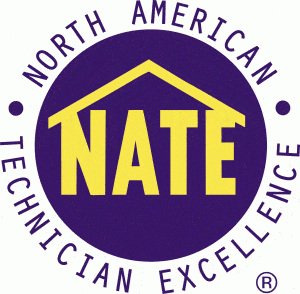
What is NATE?
NATE stands for North American Technician Excellence. NATE certification is one of the most-recognized HVAC certifications in the industry. Those who achieve this status end up having greater success and longevity in their careers.
The first step to acquiring a NATE certification is to pass the core test. As long as you keep your NATE certification current, you will never have to take the core test again. Once you pass the core test, a specialty exam must be chosen to complete NATE certification. Installation, Service, and Senior are the three specialty areas to choose from. We’ll focus on the core test first and break down each as we go.
When preparing for the core test, and later for one of the specialty tracks, it is important to know that every NATE test is based on what is referred to as KATEs (Knowledge Areas of Technician Expertise). There are numerous KATEs for each exam. We’ll go over some of the most important ones and where to find those below.
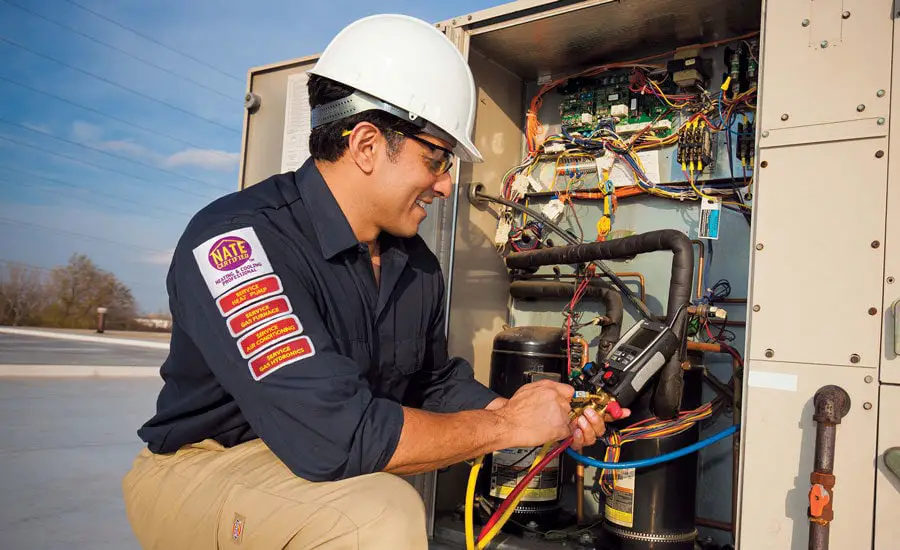
Benefits of NATE Certification
If you are currently working in the HVAC industry you know that it is a demanding job physically and mentally. Many new technicians wonder why they should add hours of studying to their already busy schedules for an exam that is not required. If you are properly trained and know how to do your job, what difference does having a NATE certification make? Does attaining a NATE certification make you a better technician?
Teaching others a subject you already know often enhances your own level of understanding. The same goes for pouring over information that you already know. There is no substitute for years of experience. But the pursuit of knowledge should never be minimized, especially in an industry that constantly advances and continually becomes more competitive.
Conventional wisdom tells us “learning is good for you”, so there’s one reason. But HVAC is a highly competitive industry in which your marketing skills play a key role in your bottom line. In short, having a NATE certification could increase your chances to make more money, no matter how you feel about its accuracy in reflecting a technician’s skill level. If a prospective employer or customer asks if you have a NATE certification, do you think they would prefer a yes or a no?
There are not specific experience requirements to take them. However, it’s good to have some work or educational experience before you take the NATE certification exams. If you have less than two years or are just starting out, you might want to take either the “ready to work” or “HVAC support technician” exam depending on your level of experience. We will go into detail about these two certificates after covering how to gain a traditional NATE certification.
What is Covered By NATE?
As we have already mentioned, the first step in the NATE certification process is passing the core exam. According to NATE’s website, The core exam tests a candidate’s general knowledge, construction knowledge, and HVACR-specific knowledge in the areas of safety, tools and basic construction. You’ll need to understand basic science, how to achieve desired conditions, how to take temperature and humidity measurements and understand basic electrical work.

A Detailed Breakdown for Professional Certification
Here are the areas covered, and what themes are part of them.
- Safety (18% of core exam) – government regulations, safe work practices involving machinery, electricity, torch work, handling of containers, and hazmat procedures.
- Tools (10% of core exam) – tools and scales, fabrication tools, tubing tools.
- Basic Construction (8% of core exam) – Plans and Specifications, Plumbing (Piping) Layouts, Room Specs – Clear Span & Ceiling Heights, Roofing, Ceilings, Walls, Floors, Fenestration, Girders & Trusses, Chimneys.
- Using Basic Science (10% of core exam) – chemistry basics, electrons in electricity, electrical basic terms, magnetism, AC and DC circuits, basic circuit analysis, electricity – generation and distribution, solid-state electronics, pressure measurements, mathematics, mechanics, gas laws, electrical load types, power.
- Achieving Desired Conditions (14% of core exam) – temperature, humidity, air quality, sound.
- Taking Temp & Humidity Measurements (14% of core exam) – physical measurements / temperature & heat, thermometers, humidity measurement and calculations.
- Basic Electricity (26% of core exam) – symbols, field wiring diagrams, pictorial diagrams, schematic diagrams, single phase motors, three-phase motors, variable speed motors, actuator motors, digital electrical meters.

Additional Reference Material for the Nate Certification Core Exam
- American National Standards Institute (ANSI) / Air Conditioning Contractors of America (ACCA)
- Manuals “D” “J” “QI” – Quality Installation, and “S”
- ACCA Manuals “T” and “RS” – Latest Editions
- ACCA Residential Duct Diagnostics and Repair – Latest Edition
- AHRI-Hydronics Section – IBO/RAH – Latest Edition
- International Code Council – Latest Editions
- Mechanical, Plumbing, Energy Conservation, and Residential
- Uniform Mechanical Code – Latest Edition with Addendum
- Specification of Energy-Efficient Installation and Maintenance Practices for Residential HVAC Systems developed by Consortium for Energy
- Efficiency (CEE) – Latest Edition with Addendum
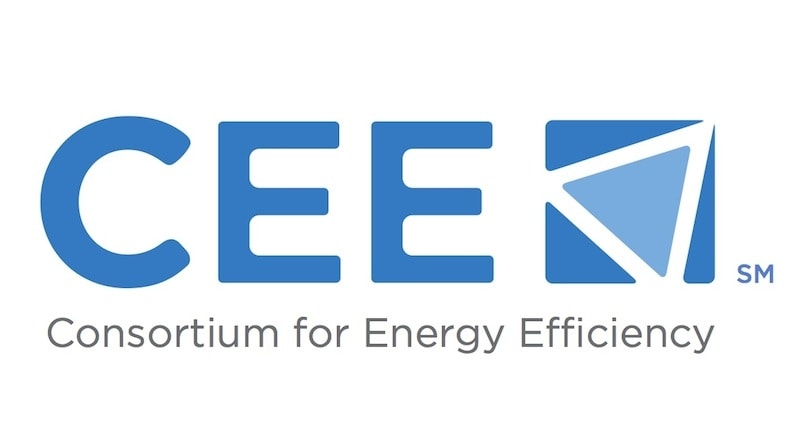
- ASHRAE Standard-62.2 – Latest Edition with Addendum
- ANSI//ASHRAE Standard- 152-2004 – Latest Edition with Addendum
- ENERGY STAR™ Home Sealing Standards – Latest Edition with Addendum
- Duct Calculators – Sheet Metal, Duct board, and Flexible Duct
- American National Standards Institute (ANSI)/Sheet Metal and Air Conditioning Contractors’ National Association, Inc. (SMACNA) Manuals
- HVAC Duct Construction Standards –Metal and Flexible
- Sheet Metal and Air Conditioning Contractors’ National Association, Inc. (SMACNA) Manuals
- Fibrous Glass Duct Construction Standards, Residential Comfort System Installation Standards Manual, and HVAC Air Duct Leakage Test Manual
- Air Diffusion Council Flexible Duct Performance & Installation Standards
- North American Insulation Manufacturers Association (NAIMA) Manuals
- Fibrous Glass Duct Construction Standards and A Guide to Insulated Air Duct Systems
- International Fuel Gas Code – Latest Edition with Addendum

- National Fuel Gas Code – Latest Edition with Addendum
- Generally accepted HVACR textbooks
- Generally accepted construction textbooks
- OSHA safety standards
- National Fire Protection Association – Latest Editions (Gas, Oil, and Electric)
Specialty Tracks
Once the core exam is passed, you must also pass a specialty exam to obtain NATE certification. There are three tracks to choose from when choosing which specialty exam to take. The three specialty areas to choose from are installation, service, and senior.
Installation Track Specialty Exams
(100 question with a 2.5-hour time limit)
These are your options for the installation specialty exam:
- Air Conditioning Installation
- Air Distribution Installation
- Air to Air Heat Pump Installation
- Gas Heating (Air) Installation
Service Track Specialty Exams
(100 question with a 2.5-hour time limit)
If you elect for the service track, you have these choices:
- Air Conditioning Service
- Air Conditioning Service (in Spanish)
- Air Distribution Service
- Heat Pump (Air to Air) Service
- Heat Pump (Air to Air) Service (in Spanish)
- Gas Heating (Air) Service
- Gas Heating (Air) Service (in Spanish)
- Oil Heating (Air) Service
- Hydronics Gas Service
- Hydronics Oil Service
- Light Commercial Refrigeration Service
- Commercial Refrigeration Service
Senior Level Technician Nate Certification
You must pass two of the NATE specialty exams mentioned above before being allowed to attain the senior level certification. Once you have those two, you need to pass the HVAC Efficiency Analyst exam.

HVAC Efficiency Analyst Exam Sub-categories
(100 questions with a 4-hour time limit)
- Load Calculation (15% of exam)
- Equipment Selection (10% of exam)
- Air Distribution (20% of exam)
- Hydronic Distribution (7% of exam)
- System Performance (35% of exam)
- Indoor Air/Environment Quality (7% of exam)
- Planned Maintenance (6% of exam)
Additional Reference Material for Nate Certification Specialty Exams
- Duct Calculators – Sheet Metal, Ductboard, and Flexible Duct
- American National Standards Institute (ANSI) / Air Conditioning Contractors of America (ACCA) Manuals – Latest Edition
- “D”, “J”, “QI” – Quality Installation, and “S”
- ACCA Manuals “T” and “RS” – Latest Editions
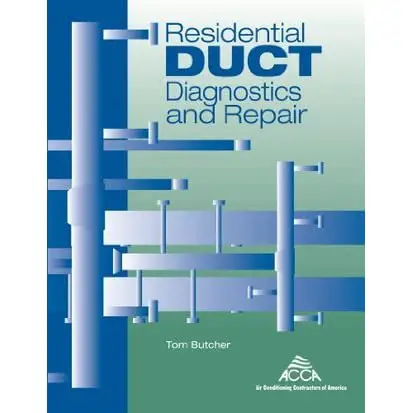
- ACCA Residential Duct Diagnostics and Repair
- American National Standards Institute (ANSI) / Sheet Metal and Air Conditioning Contractors’ National Association, Inc. (SMACNA) Manuals
- HVAC Duct Construction Standards – Metal and Flexible
- Sheet Metal and Air Conditioning Contractors’ National Association, Inc. (SMACNA) Manuals
- Fibrous Glass Duct Construction Standards, Residential Comfort System Installation Standards Manual, and HVAC Air Duct
- Leakage Test Manual
- International Energy Conservation Code – Latest Edition with Addendum
- Air Diffusion Council Flexible Duct Performance & Installation Standards
- North American Insulation Manufacturers Association (NAIMA) Manuals
- Fibrous Glass Duct Construction Standards and A Guide to Insulated Air Duct Systems
- International Mechanical Code – Latest Edition with Addendum
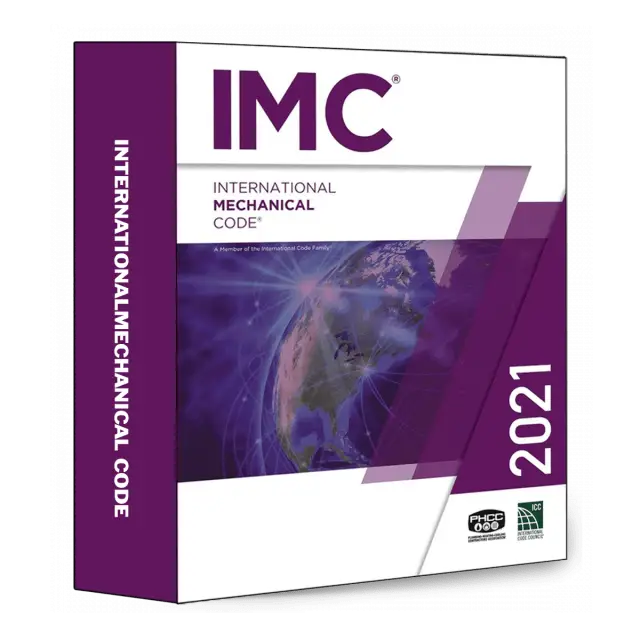
- International Fuel Gas Code – Latest Edition with Addendum
- National Fuel Gas Code – Latest Edition with Addendum
- Specification of Energy-Efficient Installation and Maintenance Practices for Residential HVAC Systems developed by Consortium for Energy
- Efficiency (CEE) – Latest Edition with Addendum
- ASHRAE Standard-62.2 – Latest Edition with Addendum
- ANSI / ASHRAE Standard-152-2004 – Latest Edition with Addendum
- ENERGY STAR™ Home Sealing Standards – Latest Edition with Addendum
- AHRI-Hydronics Section-IBO/RAH Latest Edition
Entry Level Certificates
As mentioned earlier, there are also NATE-associated exams recommended for technicians with less than two years’ experience. The “ready to work” exam is for individuals entering the industry with little or no training. This is not a certification but you will receive a certificate you can show to potential employers once you pass the exam.

The exam can be downloaded and, unlike the NATE certification, is not proctored. If you are a technician with six months to a year of experience, the “HVAC Support Technician” exam is designed for you. This exam is also a certificate-based program instead of a certification.
How to Prepare
Now that you have an outline for what to expect on your journey to becoming NATE certified, it is time to come up with a plan to pass the exam and actually get that certification!
Not everyone learns the same way, but it might be good to start with the core test and begin with the first sub-category, safety. This is 18% of the core test.
If you learn best by reading, then obtain as much literature as you can about the KATE’s mentioned on this site and NATE’s website as you can. If you or more visual you may want to involve more videos on the subject.
Gather as much information as you can on your own about the exam. Once you have done that, you should begin taking practice tests and completing formatted study programs online. Go back and forth from your study materials, to practice tests, to the formatted study programs. Once you get to the point that you can pass various practice tests without referring to your material, keep studying until you can ace them all!

Taking the Exam
Now that you know what can be on the NATE certification exam and how to prepare for it, you probably want to know where you can go to test and how much it will cost. Technical colleges, industry wholesalers/distributors, and contractors are all places you can get information about NATE.
A list of NATE testing organization partners can be found on the NATE website. These organizations are authorized to administer the exams but are not directly associated with NATE. Each facility sets its own fees and schedule.
Conclusion
HVAC is a technology-based industry that is constantly evolving. In order to stay relevant in this fast-paced industry, you’ve got to be ready to constant change. NATE certification lets your customers and others in the industry know you will go the extra mile to be considered a top technician.
It also gives you a concrete way to stay relevant and be aware of regulatory and technical changes. Hopefully you will be able to translate the information we’ve presented here into a game plan that leads to you becoming NATE certified.
Other Related Content
Here is some other content that might interest you:

How and where can I access reliable, informative videos to further my knowledge of Hvac systems?
Hi Richard,
I haven’t found a “one stop shop” for videos. A few tool manufacturers make good ones – I’ve seen a few on leak detectors. But of course they’re also trying to sell their product.
There’s a variety of videos on YouTube also, but again, it’s here and there. I know the HVAC for Beginnners website has an extensive series, but it’s not free, and I haven’t tried it myself.
Hi,
I’ve been doing air conditioning and refrigeration for 21 years am 35years old this year and i want to get certified. Am knowledgeable in trouble shooting, repair, service,and installation. What do i need to do to get enroll to achieve a certification to be certified.
Regard
Clint Daxon
Hi Clint,
By certified, do you mean your state licensing? Every state has its own rule, typically overseen by a Contractor’s Board or some similar entity. You can get started with our state licensing overview article which has links to each state. Requirements really vary widely from state to state – some have no laws (although cities or counties might); some require only contractors to be licensed and others requiring anyone in the industry to be licensed.
Work with refrigerants requires EPA certification, which is from the federal government. That information is at this link.
NATE certification is nice to have but isn’t a legal requirement. (Just mentioning that since it’s the subject of the article you commented on). You can visit their website if you want to pursue their certification. Again, it’s not mandatory but some employers may look at it as a way to show your qualifications.
Dear Bob
Is my open book EPA608. CORE and type 1 certification I obtained with Mainstream Engineering would be accepted in CANADA.
Unfortunately no.